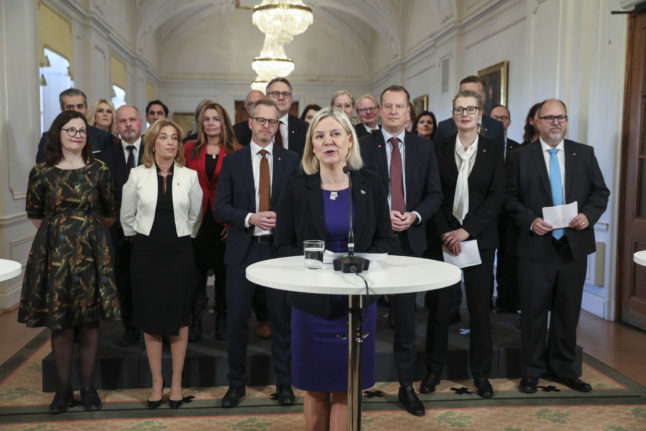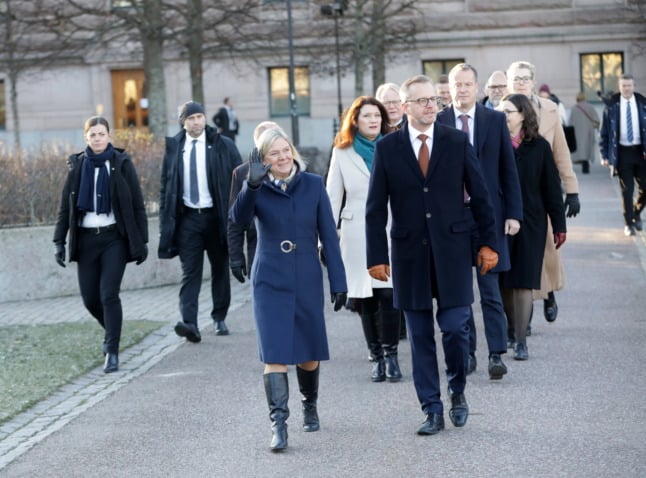What does Andersson want to achieve with her new government?
In her speech to parliament before announcing her ministers, Andersson mentioned the fight against crime and segregation, “driving the green industrial revolution” and “taking back control of welfare” as her three main priorities.
“Every minister in the government that takes office today will be tasked, within their area of responsibility and with the support of the relevant government agencies, with leaving no stone unturned in bringing an end to gang crime and segregation,” said Andersson.
She also underlined the importance of individuals, stating that “we all need to do our part”, and that “no one individual can break segregation or stop the shootings or the gangs on their own”.
“Everyone can do something,” Andersson said.
“Help out in local sports associations so that there are recreational activities for our children and young people. Stay and talk for a few minutes with someone who needs to improve their Swedish to enter into Swedish society,” she continued.
For a full English translation of her statement of government policy, click here.
Who are the new ministers in Andersson’s cabinet?
Andersson’s new Social Democrat government is a major shake-up, featuring a lot of new faces not seen in the previous cabinet – over a third of her ministers are new.
Changes to the cabinet are Mikael Damberg (previously Minister for Home Affairs) taking over Andersson’s role as Minister for Finance; Karl-Petter Thorwaldsson (previously leader of the Swedish Trade Union LO) who will be taking over as Minister for Business, Industry and Innovation from Ibrahim Baylan, who is retiring from politics after two decades as a top-ranking Social Democrat; and Anna-Caren Sätherberg, who will be the new Minister for Rural Affairs – a role which did not exist in the previous government.
Furthermore, Johan Danielsson, member of the EU parliament, will be taking over as Minister for Housing and Deputy Minister of Employment from outgoing Green Party politician Märta Stenevi – whose official title was “Minister for Gender Equality and Housing, with responsibility for urban development, anti-segregation and anti-discrimination”.
Additionally, Matilda Ernkrans is leaving her role as Minister for Higher Education and research and joining the Ministry for Foreign Affairs as Minister for International Development Cooperation (taking over from the Green Party’s Per Olsson Fridh). There will be two new additions to the Ministry of Finance: Max Elger (currently political advisor to Magdalena Andersson) who will become Minister for Financial Markets, taking over from the Green Party’s Åsa Lindhagen, and Ida Karkiainen who will be the new Minister for Public Administration, taking over from Social Democrat Lena Micko, who chose to step down after two years in the role.
Anders Ygeman, formerly Minister for Energy and Digital Development under the Ministry of Infrastructure, has been moved to the Ministry of Justice, where he will be working as Minister for Integration and Migration, another new ministerial role – the previous government had a Minister for Justice and Migration, Morgan Johansson, whose new role will be as a combined Minister for Justice and Home Affairs instead.
Finally, Khashayar Farmanbar will be taking over Ygeman’s previous role as Minister for Energy and Digital Development, and Annika Strandhäll will be taking over from Green Party MP Per Bolund as Minister for Environment and Climate.
Two of Andersson’s new ministers have not held poltical roles before.
The first is Lina Axelsson Kihlblom, who will be the new Minister for Schools. Axelsson Kihlblom is known from TV series Rektorerna or “The Headteachers”, where she worked on improving low school results in Ronnaskolan, Södertälje. She is also making history as Sweden’s first out trans woman in a ministerial role.
The second minister brought in from outside of politics is Jeanette Gustafsdotter, the incoming Minister for Culture, who is taking over from the Green Party’s Amanda Lind, whose official title was “Minister for Culture and Democracy, with responsibility for sport”. Gustafsdotter was – until now – general secretary of the Swedish Museums Association.
The other ministers in Andersson’s cabinet remain the same as the last government.
Another particular minister to note in Andersson’s new cabinet is Infrastructure Minister Tomas Eneroth, who is currently being investigated on suspicion of sexual harassment after placing his hand on a woman’s back during the Social Democrats’ party congress earlier in November.
Andersson commented the investigation in a press conference after announcing her cabinet, stating that it was “good that the situation is being investigated,” and that she is “very proud to be leader of a party where members take up issues like this and make sure that they get investigated”.
On the incident in question, Andersson stated that “there is no doubt about what has happened, and in this case Tomas Eneroth has asked the woman for an apology. He has been clear that it was accidental on his part. I see no reason not to believe that,” she continued.
Here is a full run-down of Andersson’s new cabinet:
Prime Minister’s Office
Prime Minister: Magdalena Andersson
Minister for EU Affairs: Hans Dahlgren
Ministry of Employment
Minister for Employment and Equality: Eva Nordmark
Minister for Housing and Deputy Minister of Employment: Johan Danielsson
Ministry of Finance
Minister for Finance: Mikael Damberg
Minister for Financial Markets: Max Elger
Minister for Public Administration: Ida Karkiainen
Ministry of Defence
Minister for Defence: Peter Hultqvist
Ministry of Infrastructure
Minister for Infrastructure: Tomas Eneroth
Minister for Energy and Digital Development: Khashayar Farmanbar
Ministry of Justice
Minister for Justice and Home Affairs: Morgan Johansson
Minister for Integration and Migration: Anders Ygeman
Ministry of Culture
Minister for Culture: Jeanette Gustafsdotter
Ministry of the Environment
Minister for Environment and Climate: Annika Strandhäll
Ministry of Enterprise and Innovation
Minister for Business, Industry and Innovation: Karl-Petter Thorwaldsson
Minister for Rural Affairs: Anna-Caren Sätherberg
Ministry of Health and Social Affairs
Minister for Health and Social Affairs: Lena Hallengren
Minister for Social Security: Ardalan Shekarabi
Ministry of Education and Research
Minister for Education: Anna Ekström
Minister for Schools: Lina Axelsson Kihlblom
Ministry for Foreign Affairs
Minister for Foreign Affairs: Ann Linde
Minister for Foreign Trade and Nordic Affairs: Anna Hallberg
Minister for International Development Cooperation: Matilda Ernkrans





 Please whitelist us to continue reading.
Please whitelist us to continue reading.
Member comments